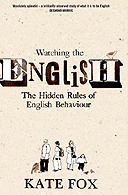
Watching
the English: The Hidden Rules of English Behaviour (April
11 2005) by Kate Fox takes a revealing look at the quirks, habits and
foibles of the English people. She puts the English national character under
her anthropological microscope, and finds a strange and fascinating culture,
governed by complex sets of unspoken rules and byzantine codes of behaviour.
The rules of weather-speak. The ironic-gnome rule. The reflex apology rule. The
paranoid-pantomime rule. Class indicators and class anxiety tests. The
money-talk taboo and many more ...Through a mixture of anthropological analysis
and her own unorthodox experiments (using herself as a reluctant guinea-pig),
Kate Fox discovers what these unwritten behaviour codes tell us about
Englishness.

Thinking, Fast and Slow by Daniel Kahneman (October 25, 2011)
Winner of the National
Academy of Sciences Best Book Award
in 2012
Selected by the New York Times Book Review as one of the
best books of 2011
A Globe and Mail Best Books of the Year 2011 Title
One of The Economist’s 2011 Books of the Year
One of The Wall Steet Journal's Best Nonfiction Books of the
Year 2011
Winner of the 2011 Los Angeles
Times Book Prize for Current Interest
Daniel Kahneman, recipient of the Nobel Prize in Economic
Sciences for his seminal work in psychology that challenged the rational model
of judgment and decision making, is one of our most important thinkers. His
ideas have had a profound and widely regarded impact on many fields—including
economics, medicine, and politics—but until now, he has never brought together
his many years of research and thinking in one book.
In the highly anticipated Thinking, Fast and Slow, Kahneman
takes us on a groundbreaking tour of the mind and explains the two systems that
drive the way we think. System 1 is fast, intuitive, and emotional; System 2 is
slower, more deliberative, and more logical. Kahneman exposes the extraordinary
capabilities—and also the faults and biases—of fast thinking, and reveals the
pervasive influence of intuitive impressions on our thoughts and behavior. The
impact of loss aversion and overconfidence on corporate strategies, the
difficulties of predicting what will make us happy in the future, the
challenges of properly framing risks at work and at home, the profound effect
of cognitive biases.
The Italians by Luigi Barzini (1964)
In this consummate portrait of the Italian people,
bestselling author, publisher, journalist, and politician Luigi Barzini delves
deeply into the Italian national character, discovering both its great
qualities and its imperfections. Barzini is startlingly frank as he examines
"the two Italies": the one that created and nurtured such luminaries
as Dante Alighieri, St. Thomas of Aquino, and Leonardo da Vinci; the other,
feeble and prone to catastrophe, backward in political action if not in
thought, "invaded, ravaged, sacked, and humiliated in every century."
Deeply ambivalent, Barzini approaches his task with a combination of love,
hate, disillusion, and affectionate paternalism, resulting in a completely
original, thoughtful, and probing picture of his countrymen.
Birth and Death of Meaning by Ernest Becker (1971)
Uses the disciplines of psychology, anthropology, sociology
and psychiatry to explain what makes people act the way they do.
Ernest Becker receives his Ph.D. in Cultural Anthropology
from Syracuse University,
Dr. Ernest Becker (1924-1974) taught at the University
of California at Berkeley, San
Francisco State College, and Simon Fraser University, Canada. He is survived by
his wife, Marie, and a foundation that bears his name--The Ernest Becker
Foundation.

59 Seconds: Think a Little, Change a Lot by Richard Wiseman (December 29, 2009)
Richard Wiseman has been troubled by the realization that
the self-help industry often promotes exercises that destroy motivation, damage
relationships, and reduce creativity: the opposite of everything it promises.
Now, in 59 Seconds, he fights back, bringing together the diverse scientific
advice that can help you change your life in under a minute, and guides you
toward becoming more decisive, more imaginative, more engaged, and altogether
more happy.
From mood to memory, persuasion to procrastination,
resilience to relationships, Wiseman outlines the research supporting the new
science of “rapid change” and, with clarity and infectious enthusiasm,
describes how these quirky, sometimes counterintuitive techniques can be
effortlessly incorporated into your everyday life. Or, as he likes to say:
“Think a little, change a lot.”

DVD Set (24 lectures) : Terror of History: Mystics, Heretics, and
Witches in the Western Tradition by Professor Teofilo F. Ruiz.
Dr. Teofilo F. Ruiz is Professor of History at the University
of California, Los
Angeles. A student of Joseph R. Strayer, Dr. Ruiz
earned his Ph.D. from Princeton University.
Western civilization is closely associated with reason and
science, and with exceptional accomplishment in art, architecture, music, and
literature. Yet it has also been characterized by widespread belief in the
supernatural and the irrational—with mystics who have visions of the divine,
and with entire movements of people who wait in fervent anticipation of the
apocalypse.
In addition, Western culture has been the setting for
repeated acts of barbarism: persecutions of certain groups such as Jews, or
accused heretics and witches. Why has this been the case? This two-part series
invites you to consider what might be called the "underbelly" of
Western society, a complex mixture of deeply embedded beliefs and unsettling
social forces that has given rise to our greatest saints and our most shameful
acts. The "terror of history," according to Professor Teofilo F.
Ruiz, is a deeply held belief-dating from the ancient Greeks to Nietzsche and
beyond-that the world is essentially about disorder and emptiness, and that
human beings live constantly on the edge of doom. We see history as terrifying,
so we try to escape it. One strategy is to withdraw through transcendental
experiences. Another, unfortunately, is to shift our fears onto scapegoats such
as lepers, nonconformists, and other outsiders whom we choose to blame for
"the catastrophe of our existence," as Professor Ruiz puts it.